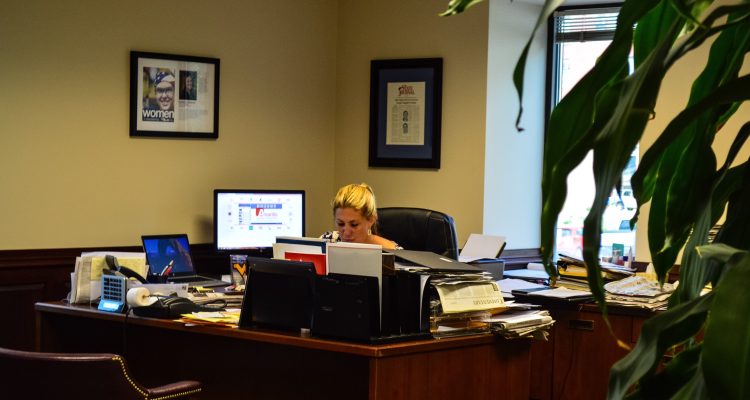She’s got this work ethic, you see, one that wakes her early but leaves her up late, and that’s because she’s a devoted wife, a dedicated mother of two daughters and a son, a Mountain State lawmaker, and now the president of the Wheeling Area Chamber of Commerce.
Even after Erikka Storch suffered a stroke early Friday morning on Aug. 26, she insisted, not surprisingly to those who know her, on doing everything she could do to help her lifesavers.
“I couldn’t get my right arm to function at all, but I was trying to do everything I could with my left arm and hand. Anything I heard, I tried to do,” she recalled. “I was trying to keep my mind sharp instead of falling into a fog. I didn’t know what was happening, really, but I wanted to stay as sharp as I could.”
She suffered a stroke, not one caused by blockage within the carotid artery but instead by a clot on the left side of her brain. It was one of those days when, after a workout you collapse on a restroom floor, get your life saved by a good friend, and then receive far more prayers than ever expected for family, friends, and from complete strangers.
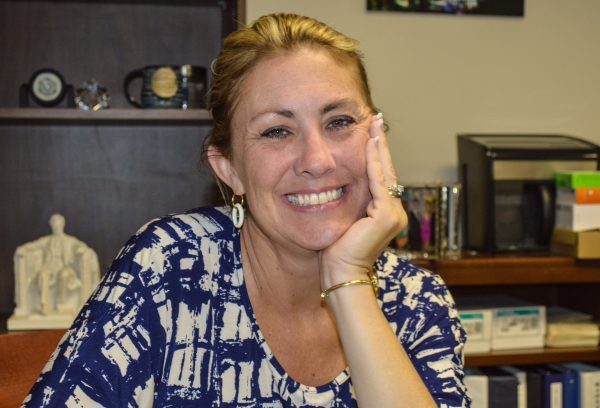
One of those days during the lifetime of someone who has represented most of the people who reside in Ohio County. She voted against repealing the prevailing wage laws in West Virginia and also the Right to Work implementation. Storch was also a steadfast, “HELL NO!” on the Religious Freedom Restoration Act and scoffed at anything else that would not benefit her constituents of the Third House District.
So when social media members were conducting the usual speculative discussions on her behalf, this public official was not surprised.
“There were people saying that I was transported to OVMC while others said I went to Wheeling and Ruby, and there were people saying that I was still here in Wheeling,” Storch said. “It’s really been all over the board, but the truth is that I was taken from the gym to Wheeling Hospital, and then I was life-flighted from there to UPMC Presby.
“What’s amazing to me is the fact that it all started close to 7 a.m. and by 11 a.m. I was pretty much OK,” she said. “At one point I couldn’t use my right side, but could use the left side, but by 11 a.m. I could use both sides again. I was awake during the procedure when they removed the clot, but I had a really bad headache. It was all so shocking how fast and amazing it all was. It’s really hard for me to believe.
“I was scared to death; trust me because I didn’t know what was going on or what to expect, but here I am, and there are a lot of ‘Thank Yous I have for a lot of people.”
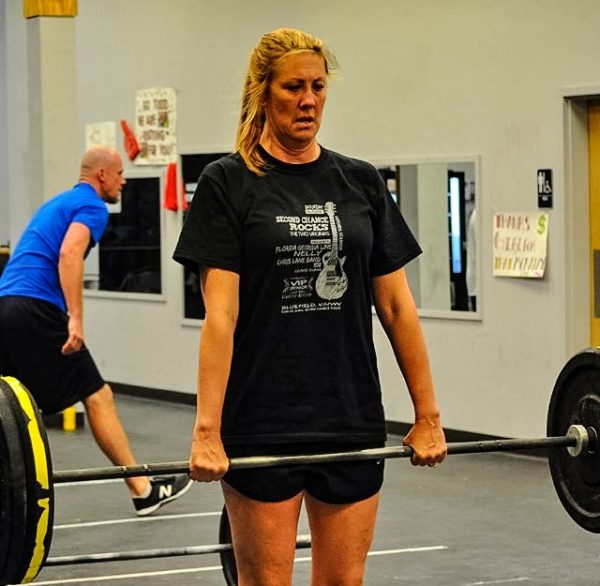
‘Maybe a Splash of Water’
A few months ago Storch accepted an invitation to participate in the Ohio Valley Crossfit Challenge at the Ryan Fern Healthplex in Benwood. When it was finished, she opted to continue her workout, and early that Friday morning 15 days ago that’s where she was when something seemed very wrong. It wasn’t necessarily a dizzy thing or a queasy feeling, but it was something.
“I had just finished a workout of four sets of squats and things, and when I was done, I think I felt weird, so that’s when I decided to go to the restroom so I could splash water in my face,” Storch recalled. “I really don’t remember if I really did splash any water on my face, but I didn’t really feel anything major except that I lost the use of my right arm. It didn’t want to function, so that’s when I put my back on the wall, and I slid down to the wall because I thought sitting at that point would be a pretty good idea.
“Then I thought the best thing to do was lie on the floor, so I did that,” she continued. “Then a lady came into the restroom, and that’s who, I guess, ran to get Ryan. (Ryan Ferns owns the fitness center where Storch was working out.) That’s when Ryan started asking me some things, and although I thought I was answering him, I guess what I was actually saying was nothing more than gobbledygook.”
She was swiftly transported to Wheeling Hospital, where doctors administered tPA, or tissue plasminogen activator, and then she was quickly life-flighted to UPMC Presbyterian Hospital in the Oakland section of Pittsburgh.
And Storch closed her eyes during the 20-minute journey.
“There were too many windows,” she said. “Even when I was a flight attendant after college, I’d feel that queasy feeling when I would see us in the air, and everything was moving around, and the helicopter I was in had windows everywhere.
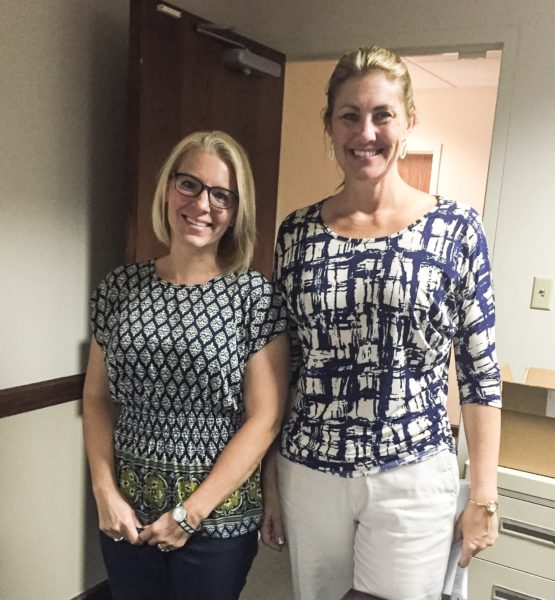
“Call it sea-sickness or whatever,” she added. “I just didn’t want to throw up on top everything else that was going on.”
At UPMC Presby, physicians entered an artery near her right leg, reached all the way into the left side of her brain, collected the clot, and soon Storch could use her right arm again and was able to resume speaking over time. Immediately after the catheterization, she was told to be as still as possible for at least four hours to allow healing, and during that time she arrived at a conclusion: Ryan Ferns saved her life.
“Ryan was there with me from the moment he saw me on the restroom floor. He was at the hospital, too. He saved my life, and when I think about what he did for me, it makes me cry,” Storch said through tears. “He saw what was going on immediately, and he didn’t have to come to the hospital, but that’s what he did. He diagnosed it and then started talking to the neurologist.
“From what I have been told, the doctors at Wheeling Hospital were hesitant to give me the tPA, but Ryan told them they needed to give it to me and, I’ve been told he was pretty forceful at the time,” she continued. “Granted I was in a fog, and things may not have happened exactly the way I remember or have been told, but Ryan got Ken Nanners involved along with Vince Caruso, Angelo Georges, and Dr. Mercer. It was Ryan who assembled the, ‘A-Team.’”
In addition to owning the fitness facility, Ferns serves as one of two senators representing West Virginia’s First Senatorial District following a four-year stint in the House of Delegates. He and Storch, both members of the state’s Republican Party, have collaborated on a plethora of issues during the past six years.
Their relationship, obviously, now contains an added a layer.
“He was the catalyst when it came to me getting the help I needed as fast as I needed it, and I know when I finally get to see him, I am going to cry,” Storch admitted. “I’ve just talked to him on the phone, but I know every time I see him for a while I’m just going to cry.
“Poor Ryan. Little did he know that he was going to inherit a cranky basket case of whatever,” she said with a laugh. “I’m not sure I’ll be able to explain to him how much I appreciate what he did for me, but someone told me, when they said something to him, that he said it wasn’t a big deal; that I’ve always had his back, so why wouldn’t he have mine? I think he had much more than just had my back that day.”

She Hates That Word
Five days after Storch was released as three-night patient in Presby’s Intensive Care Unit, the Storch family hosted a yard sale at their home on Edgwood Street. Storch, along with her youngest, Payton, had been determined to rid clutter from, ‘their stuff” so Payton’s “personal space” could grow. She’s a pre-tween, after all, and she hopes for a larger room even if it means walls must come down.
There also were the usual gold seekers who stopped by, but also there were many more who sought two-eye convincing that their friend, their neighbor, or their lawmaker was indeed OK.
“There were a lot of people who stopped by who didn’t care about anything that was for sale that morning. They just wanted to say hi and to check to see how I was doing,” she reported. “I knew most of the people, but there were some who stopped by that I didn’t know, and that was very nice of those people.
“And then I came back to work this week, but I’m not working the full days I was before,” she continued. “I’ll work up to that again in the next few days, and then I expect everything to get back to normal with my family, my work, and my campaign.”
In her mind, though, are two nagging questions: Why the clot? What caused it?
Could. There. Be. Another. One?
“That does bother me, but I’m trying to get past that. I’m still early as far as the follow-up is concerned, and I still have a bunch of tests to go through,” Storch explained. “I have something next week and something else next month, and I can tell you I’m getting used to the MRI machine.
“But why it was there, I don’t know. That’s not been determined,” she said. “It’s something that I hope the doctors do determine so I can stop doing that, but I guess there’s a chance I’ll never know.”
Strokes are caused by poor blood flow that causes cell death in the brain, and the result is the brain’s not functioning properly. The majority of strokes suffered in the United States involve citizens 65 years old or older, and long-term high-blood pressure often leads to carotid artery issues.
But Storch is in her mid-40s.
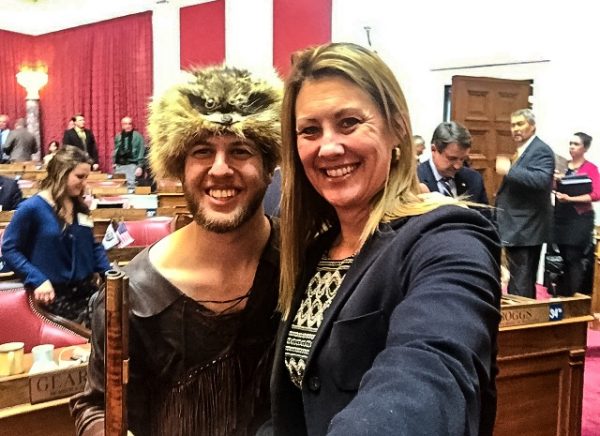
“I was as shocked as anyone could be when they told me that I had had a stroke. I didn’t have a resonating thought in my head that it was a stroke. I didn’t know what it was, but a stroke never entered my mind,” Storch said. “When they said, ‘stroke,’ I said, ‘WHAT?!’ I really didn’t know what to think, and even as I watched the procedure on this big TV that was in the room, I had no idea they were going up to grab a clot out of my brain. No clue.
“A nurse showed me some images a couple of days later, and the clot wasn’t that big at all compared to some of the other images she showed me of other clots,” she continued. “But something so small could have changed my life forever, and it’s something for everyone to think about. I didn’t know anything about strokes. I didn’t know young people could have them. I had no clue.”
There’s a part of Erikka Storch that cheers, “YAY!!!! My life experience might make some realize how to save their own life!!”
There’s another part of Erikka Storch that wants to quit thinking about it; to cease worrying about it; to stop being scared about it.
“I don’t like the word, ‘stroke.’ I don’t like it at all. It’s still hard for me to process, to be honest,” she said. “I mean, for one thing I am not an 80-year-old woman. I’ve never really known a whole lot about strokes, but I thought the majority of the people who suffered strokes were pretty old. I know better now, don’t I?
“But one thing I’ve realized was how caring and compassionate people were to me and my family. I think at first they didn’t know how to react to me, and now I think everyone is pretty much back to normal because they can tell I’m OK, but I have been overwhelmed,” the lawmaker continued. “It was so shocking how many people I don’t even know could be so kind to me. And I think people looked at me and thought, ‘If it can happen to her, what about me?’ If there’s a positive to all of this, that’s it. People now know, at least those who have paid attention to what happened to me, that it can happen to anyone at any time.”


